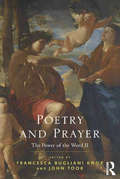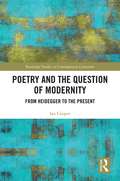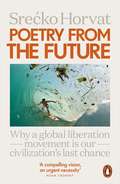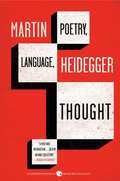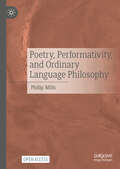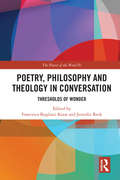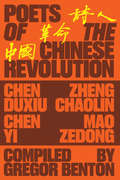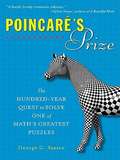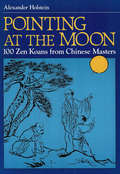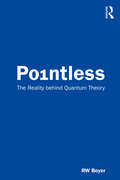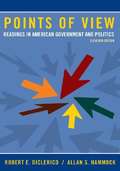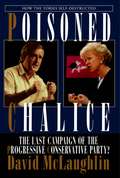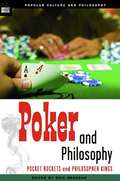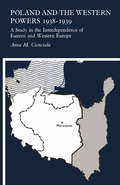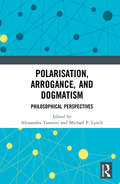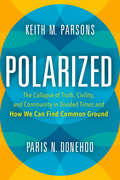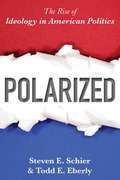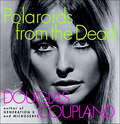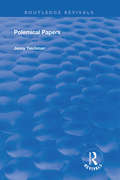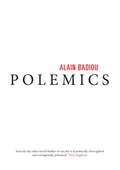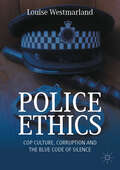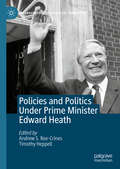- Table View
- List View
Poetry and Prayer: The Power of the Word II (The Power of the Word)
by Francesca Bugliani Knox John TookInterdisciplinary and ecumenical in scope, Poetry and Prayer offers theoretical discussion on the profound connection between poetic inspiration and prayer as well as reflection on the work of individual writers and the traditions within which they stand. An international range of established and new scholars in literary studies and theology offer unique contributions to the neglected study of poetry in relation to prayer. Part I addresses the relationship of prayer and poetry. Parts II and III consider these and related ideas from the point of view of their implementation in a range of different authors and traditions, offering case studies from, for example, the Bible, Dante, Shakespeare and Herbert, as well as twentieth-century poets such as Thomas Merton, Denise Levertov, W.H. Auden and R.S. Thomas.
Poetry and the Question of Modernity: From Heidegger to the Present (Routledge Studies in Contemporary Literature)
by Ian CooperInterest in Martin Heidegger was recently reawakened by the revelations, in his newly published ‘Black Notebooks’, of the full terrible extent of his political commitments in the 1930s and 1940s. The revelations reminded us of the dark allegiances co-existing with one of the profoundest and most important philosophical projects of the twentieth century—one that is of incomparable importance for literature and especially for poetry, which Heidegger saw as embodying a receptiveness to Being and a resistance to the instrumental tendencies of modernity. Poetry and the Question of Modernity from Heidegger to the Present is the first extended account of the relationship between Heidegger’s philosophy and the modern lyric. It argues that some of the best-known modern poets in German and English, from Paul Celan to Seamus Heaney and Les Murray, are in deep imaginative affinity with Heidegger’s enquiry into finitude, language, and Being. But the work of each of these poets challenges Heidegger because each appeals to a transcendence, taking place in language, that is inseparable from the motion of encounter with embodied others. It is thus poetry which reveals the full measure of Heidegger’s relevance in redefining modern selfhood, and poetry which reveals the depth of his blindness.
Poetry from the Future: Why a Global Liberation Movement Is Our Civilisation's Last Chance
by Srecko Horvat'A compelling vision, an urgent necessity, and not beyond reach' Noam ChomskyThe past is forgotten, and the future is without hope. Dystopia has become a reality. This is the new normal in our apocalyptic politics - but if we accept it, our helplessness is guaranteed. To bring about real change, argues activist and political philosopher Srecko Horvat, we must first transform our mindset.Ranging through time and space, from the partisan liberation movements of Nazi-occupied Yugoslavia to the contemporary culture, refugee camps and political frontlines of 21st century Europe, Horvat shows that the problems we face today are of an unprecedented nature. To solve them, he argues in this passionate call for a new radical internationalism, we must move beyond existing ways of thinking: beyond borders, national identities and the redundant narratives of the past. Only in this way can we create new models for living and, together, shape a more open and optimistic future.
Poetry, Language, Thought (Harper Perennial Modern Thought Ser.)
by Martin HeideggerPoetry, Language, Thought collects Martin Heidegger's pivotal writings on art, its role in human life and culture, and its relationship to thinking and truth. Essential reading for students and anyone interested in the great philosophers, this book opens up appreciation of Heidegger beyond the study of philosophy to the reaches of poetry and our fundamental relationship to the world. Featuring "The Origin of the Work of Art," a milestone in Heidegger's canon, this enduring volume provides potent, accessible entry to one of the most brilliant thinkers of modern times.
Poetry, Performativity, and Ordinary Language Philosophy
by Philip MillsHow can Ordinary Language Philosophy (OLP) help us understand poetry? Against John L. Austin’s exclusion of poetic utterances as parasitical, Philip Mills explores how contemporary poetics broadens the aims and scope of OLP. Through the analysis of French and American poetry that reinterprets notions such as illocution, perlocution, and language-games, Mills develops a poetic philosophy of language, revealing its viral and transformative nature. Poetry, Performativity, and Ordinary Language Philosophy bridges philosophy and poetry, showing how poetry contaminates and reshapes our ways of thinking and being in the world, and combining the poetic and the ethical in the notion of ‘poethics.’ This Open Access book offers a new perspective on the poetic and literary potential of OLP and the intersections between the philosophy of language and poetry.
Poetry, Philosophy and Theology in Conversation: Thresholds of Wonder: The Power of the Word IV
by Jennifer Reek Francesca Bugliani KnoxThis volume is a collection of essays that explains how literature, philosophy and theology have explored the role of wonder in our lives, particularly through poetry. Wonder has been an object of fascination for these disciplines from the Greek antiquity onwards, yet the connections between their views on the subject are often ignored in subject specific studies. The book is divided into three parts: Part I opens the conversation on wonder in philosophy, Part II is given to theology and Part III to literary perspectives. An international set of contributors, including poets as well as scholars, have produced a study that looks beyond traditional chronological, geographical and disciplinary boundaries, both within the individual essays themselves and in respect to one another. The volume’s wide historical framework is punctuated by four poems by contemporary poets on the theme of wonder. An unconventional foray into one of the best-known themes of the European tradition, this book will be of great interest to scholars of literature, theology and philosophy.
Poets of the Chinese Revolution: Chen Duxiu, Zheng Chaolin, Chen Yi, Mao Zedong
by Mao Tse-Tung Chen Yi Chen DuxiuHow poetry and revolution meshed in Red ChinaThe Chinese Revolution, which fought its way to power seventy years ago, was a complex and protracted event in which groups and individuals with different hopes and expectations for the Revolution competed, although in the end Mao came to rule over the others. Its veterans included many poets, four of whom feature in this anthology. All wrote in the classical style, but their poetry was no less diverse than their politics. Chen Duxiu, led China’s early cultural awakening before founding the Communist Party in 1921. Mao led the Party to power in 1949. Zheng Chaolin, Chen Duxiu’s disciple and, like him, a convert to Trotskyism, spent thirty-four years in jail, first under the Nationalists and then under their Maoist nemeses. The guerrilla leader Chen Yi wrote flamboyant and descriptive poems in mountain bivouacs or the heat of battle.Poetry has played a different role in China, and in Chinese Revolution, from in the West—it is collective and collaborative. But in life, the four poets in this collection were entangled in opposition and even bitter hostility towards one another. Together, the four poets illustrate the complicated relationship between Communist revolution and Chinese cultural tradition.
Poincare's Prize: The Hundred-Year Quest to Solve One of Math's Greatest Puzzles
by George G. SzpiroThe amazing story of one of the greatest math problems of all time and the reclusive genius who solved itIn the tradition of Fermat's Enigma and Prime Obsession, George Szpiro brings to life the giants of mathematics who struggled to prove a theorem for a century and the mysterious man from St. Petersburg, Grigory Perelman, who fi nally accomplished the impossible.<P><P> In 1904 Henri Poincaré developed the Poincaré Conjecture, an attempt to understand higher-dimensional space and possibly the shape of the universe. The problem was he couldn't prove it. A century later it was named a Millennium Prize problem, one of the seven hardest problems we can imagine. Now this holy grail of mathematics has been found.Accessibly interweaving history and math, Szpiro captures the passion, frustration, and excitement of the hunt, and provides a fascinating portrait of a contemporary noble-genius.
Pointing at the Moon
by Alexander HolsteinPointing at the Moon comprises one hundred brilliant examples of the Ch'an masters' questions and answers from the following four treatises of the Ch' an tradition: A Selection From the Five Books of the Ch 'an Masters' Sayings, The Light of the Ch 'an Sayings Recorded in the Year if Developing Virtue (A.D. 1004), The Ch'an Sayings Recorded During the Moonlit Meditation, and An Anthology if Ch'an Sayings,
Pointing at the Moon
by Alexander HolsteinPointing at the Moon comprises one hundred brilliant examples of the Ch'an masters' questions and answers from the following four treatises of the Ch' an tradition: A Selection From the Five Books of the Ch 'an Masters' Sayings, The Light of the Ch 'an Sayings Recorded in the Year if Developing Virtue (A.D. 1004), The Ch'an Sayings Recorded During the Moonlit Meditation, and An Anthology if Ch'an Sayings,
Pointing at the Moon
by Alexander HolsteinThis collection of Zen koans with extensive commentary will be of great interests to followers of Zen Buddhism.People around the world value the mind-cleansing, spiritually uplifting benefit to be gained through the practice of Cha'an (Zen) Buddhism. Central to Zen is the enigmatic koan (kung-an), a kind of riddle used by masters to shock their students into greater awareness. In this timeless collection from Chinese masters, translations of 100 of these question-and-answer riddles are presented. Each koan is followed by the author's commentary, which provides fascinating insight into the background and deeper meanings of the koans.Pointing at the Moon contains zen koeans from the following four treatises of the Zen tradition: A Selection From the Five Books of the Zen Masters' Sayings The Light of the Zen Sayings Recorded in the Year if Developing Virtue The Zen Sayings Recorded During the Moonlit Meditation An Anthology if Zen SayingsEnhanced by the 85 beautifully sketched Chinese brush paintings, Pointing at the Moon is a text certain to stimulate and challenge anyone interested in learning more about Zen and its tradition of spiritual enlightenment.
Pointing the Way
by Martin Buber Maurice S. Friedman"These essays, written between 1909 and 1954 and first published as a collection in 1957, in which the eminent philosopher relates the 'I-Thou' dialogue to such varied fields as religion, social thought, philosophy, myth, drama, literature and art, reveal Buber in the process of responding to the crises and challenges of the 20th century and enable the reader to follow his lifelong struggles toward 'authentic existence.'" -Back Cover
Pointless: The Reality behind Quantum Theory
by RW BoyerThis book examines how major interpretations of quantum theory are progressing toward a more unified understanding and experience of nature. It offers subtle insights to address core issues of wave-particle duality, the measurement problem, the mind/body problem, determinism/indeterminism/free will, and the nature of consciousness. It draws from physics, consciousness studies, and ‘ancient Vedic science’ to outline a new holistic interpretation of quantum theory. Accessible and thought-provoking, it will be profoundly integrating for scholars and researchers in science and technology, in philosophy, and also in South Asian studies.
Points of View: Readings in American Government (11th Edition)
by Robert E. Diclerico Allan S. HammockThe eleventh edition of Points of View: Readings in American Government and Politics provides instructors and students with a manageable and accessible selection of readings that present succinct, thoughtful, and diverse perspectives across a broad range of issues in American Government today. This comprehensive reader features contrasting viewpoints on current political debates and traditional topics of interest in contemporary American Government courses. By providing two opposing positions for each topic, Points of View challenges students to examine and appreciate differing perspectives.
Poisoned Chalice: How the Tories Self-Destructed
by David MclaughlinPoisoned Chalice chronicles the fateful end of the federal Progressive Conservative government in Ottawa. The Progressive Conservative Party sought to remake itself by choosing the first woman prime minister in Canadian history, but failed to heed the lessons of Meech or Charlottetown. Their strategy nearly worked. By the time the election was called, the Tories were neck and neck with Jean Chrétien’s Liberals. Then it all fell apart. This book, published exactly one year after the event, tells how and why it happened. It gives a day-by-day account of an election campaign seemingly doomed to failure. It covers the strategy, tactics and political machinations that drove the Conservative campaign from the point of view of someone "on the bus." Read the strategy memos given to Kim Campbell. Listen in on her election-night phone call to Jean Chrétien. Relive Kim Campbell’s campaigh from one end of the country to the other. More than just that, Poisoned Chalice asks fundamental questions about how one of the founding political parties of Canada could come to such an ignominious state. Does the Progressive Conservative Party have a future? Has it been overtaken for good by Reform? This book takes the reader back to the seeds of the Tories’ defeat, from the constitutional debate and referendum, to the Conservative leadership race that never was, to Kim Campbell’s shining summer, to the electoral devastation of just two seats.
Poker and Philosophy: Pocket Rockets and Philosopher Kings
by Eric BronsonDoes God play cards with the universe? Do women have better poker faces than men? What's the most existential poker movie ever made? Is life more meaningful when you go all-in? Is online poker really still poker? <P><P>Poker and Philosophy ponders these questions and more, pitting young lions against old masters as the brashness of Phil Hellmuth meets the arrogance of Socrates, the recklessness of Doyle Brunson challenges the desperation of Dostoyevsky, and the coolness of Chris Moneymaker takes on the American tradition of capitalist ingenuity. This witty collection of essays demonstrates what serious card sharks have long known: winning big takes more than a good hand and a straight face. Stacking the metaphorical deck with a serious grounding in philosophy is the key to raking it in, because as Machiavelli proved long ago, it's a lot better to be feared than loved, and lying is not the same as cheating.
Poland and the Western Powers 1938-1938: A Study in the Interdependence of Eastern and Western Europe
by Anna M. CiencialaThis study has two objectives. The first is to explain the nature and historical roots of the problems facing Polish foreign policy in 1938–39 and the manner in which they were approached by the men who shaped and directed Polish diplomacy. The second is to illustrate the political interdependence in these years of Eastern and Western Europe. This interdependence hinged on the German problem. The attitude of France and Britain towards Poland and Eastern Europe as a whole was primarily a reflection of their policy towards Germany; at the same time, this policy was the decisive factor in the individual reactions of Germany's eastern neighbours to the threat of resurgent German power.As far as Poland was concerned, she not only had to strive to avert the danger of German revisionism, the realization of which would have made her a vassal of Berlin, but she also had to consider the possibility of Soviet expansion at her expense. This study is, however, primarily concerned with Polish attempts to obtain security with regard to Germany and, in the period in question, this was the main objective of Polish diplomacy.
Polarisation, Arrogance, and Dogmatism: Philosophical Perspectives
by Alessandra TanesiniPolarisation, intransigence and dogmatism in political and moral debate have in recent years threatened to overwhelm many Western-style democracies, where for centuries reasoned argument has been a hallmark feature of tackling disagreement. For many people, this marks a worrying deterioration in the moral and political climate, threatening to create a divisive environment of "us" versus "them". In this superb collection a team of international contributors examine these pressing issues from a philosophical perspective. Topics explored include: the problem of "deep disagreements"; martial conceptions of argumentation and the motivation to argue to win; epistemic egocentrism; intellectual trust; bullshit and dogmatism; intellectual humility and the internet; epistemic and "tribal" arrogance and authoritarianism; empathy and polarisation; and epistemic rights violations. Polarisation, Arrogance, and Dogmatism: Philosophical Perspectives will be of great interest to researchers in political philosophy, applied and social epistemology, ethics and feminist philosophy, as well as those working in politics and sociology.
Polarized: The Collapse of Truth, Civility, and Community in Divided Times and How We Can Find Common Ground
by Keith M. Parsons Paris N. DonehooAn atheist philosopher and a Protestant minister interact in a constructive and respectful dialogue about their differing views on life, stressing the importance of honesty, civility, and community engagement at a time of polarized politics.Unity in diversity (e pluribus unum) -- the quintessential American value-- is under assault today, and along with it, our sense of shared community. In this book, an atheist philosopher and a United Church of Christ pastor demonstrate that common ground can still be found even by people with very different perspectives on life. In short, difference need not mean division. The authors focus on the importance of truthfulness, civility, and community. In a respectful dialogue, they exchange ideas on the nature of truth, the importance of honesty, the value of civility, the definition of community in a pluralistic society, respecting differences while avoiding divisiveness, and the consequences to our nation when ideological rancor and the demonizing of opponents dominate the public square. The authors have a personal stake as well as an intellectual interest in these issues, as they met in childhood and have maintained their friendship over the decades despite their very different life choices and career paths. They both view with alarm the widening fissures developing among Americans and conclude by pointing out a similar preference for diatribe over rational debate in the decades preceding the Civil War. At a time of shrill rhetoric, this measured, reasoned discussion between two friends shows that communication and respect are possible between people of good will.
Polarized: The Rise Of Ideology In American Politics
by Steven E. Schier Todd E. EberlyFrom campus protests to the Congress floor, the central feature of contemporary American politics is ideological polarization. In this concise, readable, but comprehensive text, Steven E. Schier and Todd E. Eberly introduce students to this contentious subject through an in-depth look at the ideological foundations of the contemporary American political machine of parties, politicians, the media, and the public. Beginning with a redefinition of contemporary liberalism and conservatism, the authors develop a comprehensive examination of ideology in all branches of American national and state governments. Investigations into ideologies reveal a seeming paradox of a representative political system defined by ever growing divisions and a public that continues to describe itself as politically moderate. The work’s breadth makes it a good candidate for a course introducing American politics, while its institutional focus makes it suitable for adoption in more advanced courses on Congress, the Presidency, the courts or political parties.
Polaroids from the Dead: And Other Short Stories
by Douglas CouplandDouglas Coupland takes his sparkling literary talent in a new direction with this crackling collection of takes on life and death in North America -- from his sweeping portrait of Grateful Dead culture to the deaths of Kurt Cobain, Marilyn Monroe and the middle class.For years, Coupland's razor-sharp insights into what it means to be human in an age of technology have garnered the highest praise from fans and critics alike. At last, Coupland has assembled a wide variety of stories and personal "postcards" about pivotal people and places that have defined our modern lives. Polaroids from the Dead is a skillful combination of stories, fact and fiction -- keen outtakes on life in the late 20th century, exploring the recent past and a society obsessed with celebrity, crime and death. Princess Diana, Nicole Brown Simpson and Madonna are but some of the people scrutinized.
Polemical Papers: Essays on the Philosophy of Life and Death (Routledge Revivals)
by Jenny TeichmanFirst published in 1997, this valuable volume is a collection of previously published, clear, non-technical essays brought together in this volume on a wide range of polemical topics including war and peace, love and sex, and life and its meanings. Written between 1979 and 1994, the papers lucidly approach human questions which are of issues to both academic philosophers and the wider, popular audience. Jenny Teichman’s polemics have been written with wit and gusto and her writing displays a talent for puncturing the pretensions of highly reputable thinkers and landing some well-placed blows. Much amusement can be derived from this book, along with much instruction.
Polemics
by Bruno Bosteels Alain Badiou Steve Corcoran Cecile Winter Ray BrassierFollowing on from Alain Badiou's acclaimed works Ethics and Metapolitics, Polemics is a series of brilliant metapolitical reflections, demolishing established opinion and dominant propaganda, and reorienting our understanding of events from the Kosovo and Iraq wars to the Paris Commune and the Cultural Revolution.With the critical insight and polemical bravura for which he is renowned, Badiou considers the relationships between language, judgment and propaganda--and shows how propaganda has become the dominant force. Both wittily and profoundly, Badiou presents a series of radical philosophical engagements with politics, and questions what constitutes political truth.From the Hardcover edition.
Police Ethics: Cop Culture, Corruption and the Blue Code of Silence
by Louise Westmarland"This book is an important analysis of how police themselves define and respond to police corruption and wrongdoing. It offers special insights into this hard to research issue because it is based on using similar techniques of study on samples of police over time and in different jurisdictions, all linked by an autoethnographic account by Professor Westmarland — an internationally celebrated expert on the topic — narrating her engagement with the problems of police corruption and culture. This provides a revealing account of variations over time and between places. Clearly and engagingly written this is essential reading for students, scholars, practitioners and policy makers concerned about policing and its legitimacy." -Robert Reiner, Emeritus Professor of Criminology, LSE "This is a lively and fascinating book which places our understanding of policing ethics, integrity and police corruption within a long term timeline. The author traces how a particular research technique within policing studies - the use of 'scenario' based surveys of police officers to test officers' attitudes to the seriousness of a series of possible forms of police misconduct and their willingness to report those forms to others - has been utilised in policing research over a 50 plus year history. It begins with US-based pioneering policing research in the 1970s and takes us through the use of, and lessons learnt by, scenario-based research in later decades in the UK and internationally. This includes, by way of an autoethnography, the author's own critical research over the past 20 years, revisiting some earlier published research on the theme. This book is essential reading for those studying police integrity and corruption and the wider field of police cultures." - Professor Steve Savage, Emeritus Professor of Criminology, University of Portsmouth. This book outlines over 20 years of in-depth research on police culture and the blue code of silence which is said to protect and perpetuate police misconduct. It discusses the existing literature and draws upon first-hand research with many serving police officers and some police support staff. These studies not only provide evidence of the police code but are also useful for examining why and how to prevent its ill-effects. A recent (post 1950s) history of police cultural research which concentrates on ethics and integrity is provided with reflections on change and a discussion of the College of Policing&’s introduction of a code of ethics in 2014. It asks whether anything has changed but mainly analyses the individual studies and what the potential lessons learnt are from the various scand
Policies and Politics Under Prime Minister Edward Heath (Palgrave Studies in Political Leadership)
by Timothy Heppell Andrew S. Roe-CrinesThis book explores the political and intellectual significance of Edward Heath’s leadership of the Conservative Party. It contains a series of original and distinctive chapters that feature extensive archival materials and original insights from leading political scientists and historians. The volume contributes significantly to our understanding of Conservative Party politics, leadership, and conservatism more broadly.
